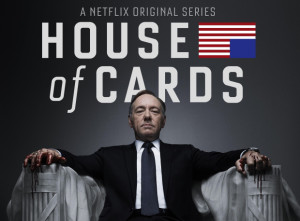
by Stephanie Palazzolo
In the light of the recent “House of Cards: Season 3,” let’s take it back to the very beginning, our first meeting with Frank Underwood and his fellow cast of sometimes underhanded, always power-hungry politicians.
The first episode of Season 1 of “House of Cards” introduces Congressman Frank Underwood (Kevin Spacey), a crafty and ruthless politician who will stop at nothing to get what he wants, even if it means destroying others’ careers in the process. After helping President Garrett Walker (Michael Gill) get in office, he reminds him of his promise to make him Secretary of State. However, Chief of Staff Linda Vasquez (Sakina Jeffrey) admits to him before the inauguration that they had actually decided on Senator Michael Kern (Kevin Kilner) for the position of Secretary of State. After his initial shock and anger, Underwood conceals his hatred and decides to ruin Kern to get his revenge. After inexperienced politician Pete Russo (Corey Stoll) is arrested for drunk driving, Underwood bails him out of jail in exchange for his unquestioning loyalty. Meanwhile, journalist Zoe Barnes (Kate Mara) joins them, exchanging her services for confidential information to write about in the Washington Herald, the newspaper that she works for as a lowly reporter. The pair use Barnes’s skills after Underwood is assigned to work on an education bill with radical liberal Donald Blythe (Reed Birney) by releasing the bill draft to the public.
“House of Cards: Episode 1” is a slow start to a good show. Although the first few minutes might seem a little dull, it only takes about half an hour for the show to start getting into the really juicy drama that will keep the audience hooked for the rest of the seasons. The cinematography and acting are both superb, especially Kevin Spacey’s portrayal of Frank Underwood’s character. Underwood seems to be a “chaotic neutral” type of character. Even though good results often come out of his selfishness, he’s willing to do anything to destroy his opponents, whether that mean blackmail or releasing government documents.
Another interesting aspect of “House of Cards” is its breaking of the fourth wall. This starts from the very start of the show, as Underwood often pauses to talk directly to the audience, often sharing a snarky remark about how he’d like to murder Congressman so-and-so by crushing his skull underneath his shoe. This unconventional method is both amusing and surprising, and it’s different enough in itself to hold the viewers’ attention during the first episode.
However, the best part of “House of Cards” isn’t its wit or acting — it’s the fact that a viewer can know literally nothing about politics and still understand the show. As a stereotypical American teenager myself, I’m embarrassed to admit that I’m not exactly the most well-informed person on politics around. Of course, I have basic knowledge (and yes, I know who the Vice President is), but even with my cluelessness, I could still understand everything that was going on in the show. Instead of focusing on politics, “House of Cards” chooses to emphasize the gripping drama behind it all — the backstabbing, the lying, the relentless search for power.

